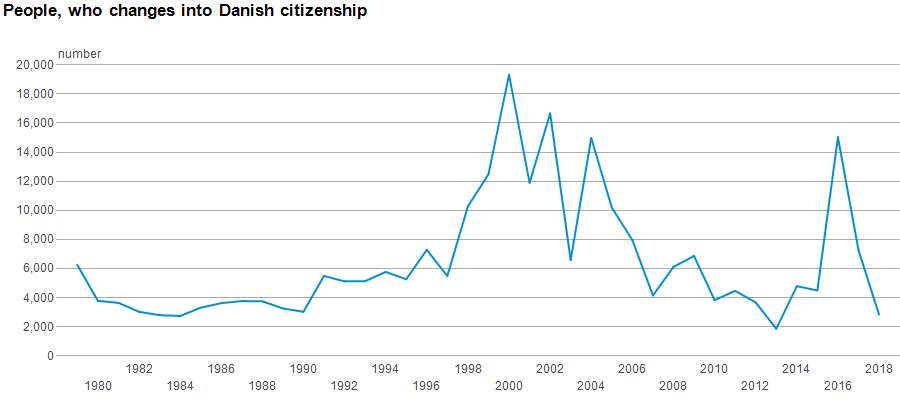The acquisition and loss of citizenship in Denmark is regulated by the Act on Danish Citizenship (lov om dansk infødsret) and the naturalization circular (Cirkulæreskrivelse om naturalisation). Art. 44(1) of the Danish constitution requires alien acquisition of citizenship by statute, which means that naturalization happens by means of an act by the legislator.
Oath of allegiance
Persons who wish to naturalize in Denmark need to declare allegiance to Denmark and the Danish society. A declaration must also be made to comply with Danish law, and respect Danish fundamental values and rule of law.
Residency requirement
The applicant needs to have legal and permanent residence in Denmark. The minimum residence requirement to naturalize is 9 years. The residence requirement is more lenient towards refugees and stateless persons (8 years), Nordic citizens (2 years) and spouses of Danish citizens (6-8 years, depending on the duration of the marriage). If the applicant arrived in Denmark before his 15th year, he or she may acquire citizenship after turning 18, if any education received during the stay in Denmark is of Danish character. For applicants, who have undergone a substantial part of their general education or vocational training in Denmark, the minimum residence requirement is 5 years, if the education or training is of Danish nature and of not less than three years duration unless completed with an examination or similar test.
Criminality
Applicants are not eligible for citizenship if they:
Applicants with other sentences cannot be listed in a naturalization bill until the expiration of a certain waiting period
Public debt
Persons with overdue public debt are not eligible for citizenship.
Self-support
The applicant needs to be self-supporting. This means that the applicant cannot have received social welfare under the Act on an Active Social Policy or the Integration Act for the last year prior to the presentation of the naturalization bill in Parliament, and for no longer than 6 months within the last 5 years.
Language and civic integration test
The applicant must pass a test on Danish society, culture and history. In addition the applicant must pass a Danish language proficiency test.
Dual citizenship
Dual citizenship is accepted in Denmark as of September 2015. Since then, foreigners who seek to naturalize in Denmark are not required to renounce their other citizenship.
Similarly, Danish citizens who acquire a foreign citizenship will no longer lose their Danish citizenship. Danish citizens may however voluntarily renounce their citizenship. Citizens who lost their Danish citizenship due to the rules of the former regime have the possibility of reacquiring it by declaration to the State Administration until August 2020.
Nordic citizens
Citizens Finland, Sweden, Norway and Iceland may in some cases acquire Danish citizenship by declaration to the State Administration.

Source: Statistics Denmark
Citizenship for second generation
Children of immigrant parents may acquire Danish citizenship together with a parent who naturalize. No fee is charged for children. In order to acquire Danish citizenship together with a naturalizing parent, the child must be living in Denmark, unmarried and under the age of 18, and the parent must be the child’s legal custodian; in case of shared custody, the other parent needs to give his or her consent. The child needs to fulfill the ordinary standards with regard to criminality.
A child may only apply for naturalization independently if it is not possible to naturalize with a parent. In other words, if the child has a non-Danish parent and legal custodian living in Denmark, individual naturalization is not possible. A child naturalizing on its own must be under the age of 18 until the adoption of the naturalization act. In principle, the child must fulfill the same conditions as under ordinary naturalization with regards residency, criminality, public debt and self-support. Children under the age of 12 are exempted from the language requirement and the civic integration test. Children over 12, who have passed the Danish language exams in school (9th or 10th grade), must pass the Danish language disciplines with grade point average and take the civic integration test. A child who has not yet taken the relevant exam in school, and is not expected to take it before the adoption of the naturalization act, will be assessed on the basis of a statement from the applicant’s school on whether his or her Danish language skills and knowledge of Danish society, culture and history is considered sufficient. There is no naturalization fee for children.
Data
Some statistics on the number and types of citizenship acquisition per year since 1987 can be explored through the online statistical database of Statistics Denmark.
More information about citizenship acquisition in Denmark
More information is available at the Danish Ministry of Immigration and Integration.
See also the Country Profile of Denmark on the Global Citizenship Observatory.
Application fee
In case of ordinary naturalization, adult applicants will be charged with a fee of 1200 DKK.